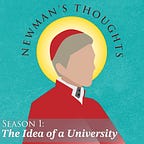Reading for Day 16: The Idea of a University, Discourse II, Theology a Branch of Knowledge § 3
Complete Recording of Discourse II @ Catholic Culture Audiobooks
Paperback with Introduction by Dr. Don Briel available @ Cluny Media
Full online text of The Idea of a University and other works by St. John Henry Newman are available @ the National Institute for Newman Studies’ Newman Reader
Still, however, this may seem to many an abrupt conclusion, and will not be acquiesced in: what answer, Gentlemen, will be made to it? Perhaps this:—It will be said, that there are different kinds or spheres of Knowledge, human, divine, sensible, intellectual, and the like; and that a University certainly takes in all varieties of Knowledge in its own line, but still that it has a line of its own. It contemplates, it occupies a certain order, a certain platform, of Knowledge. I understand the remark; but I own to you, I do not understand how it can be made to apply to the matter in hand. I cannot so construct my definition of the subject-matter of University Knowledge, and so draw my boundary lines around it, as to include therein the other sciences commonly studied at Universities, and to exclude the science of Religion. For instance, are we to limit our idea of University Knowledge by the evidence of our senses? then we exclude ethics; by intuition? we exclude history; by testimony? we exclude metaphysics; by abstract reasoning? we exclude physics. Is not the being of a God reported to us by testimony, handed down by history, inferred by an inductive process, brought home to us by metaphysical necessity, urged on us by the suggestions of our conscience? It is a truth in the natural order, as well as in the supernatural. So much for its origin; and, when obtained, what is it worth? Is it a great truth or a small one? Is it a comprehensive truth? Say that no other religious idea whatever were given but it, and you have enough to fill the mind; you have at once a whole dogmatic system. The word "God" is a Theology in itself, indivisibly one, inexhaustibly various, from the vastness and the simplicity of its meaning. Admit a God, and you introduce among the subjects of your knowledge, a fact encompassing, closing in upon, absorbing, every other fact conceivable. How can we investigate any part of any order of Knowledge, and stop short of that which enters into every order? All true principles run over with it, all phenomena converge to it; it is truly the First and the Last. In word indeed, and in idea, it is easy enough to divide Knowledge into human and divine, secular and religious, and to lay down that we will address ourselves to the one without interfering with the other; but it is impossible in fact. Granting that divine truth differs in kind from human, so do human truths differ in kind one from another. If the knowledge of the Creator is in a different order from knowledge of the creature, so, in like manner, metaphysical science is in a different order from physical, physics from history, history from ethics. You will soon break up into fragments the whole circle of secular knowledge, if you begin the mutilation with divine.
I have been speaking simply of Natural Theology; my argument of course is stronger when I go on to Revelation. Let the doctrine of the Incarnation be true: is it not at once of the nature of an historical fact, and of a metaphysical? Let it be true that there are Angels: how is not this a point of knowledge in the same sense as the naturalist's asseveration, that myriads of living things might co-exist on the point of a needle? That the Earth is to be burned by fire, is, if true, as large a fact as that huge monsters once played amid its depths; that Antichrist is to come, is as categorical a heading to a chapter of history, as that Nero or Julian was Emperor of Rome; that a divine influence moves the will, is a subject of thought not more mysterious than the result of volition on our muscles, which we admit as a fact in metaphysics.
I do not see how it is possible for a philosophical mind, first, to believe these religious facts to be true; next, to consent to ignore them; and thirdly, in spite of this, to go on to profess to be teaching all the while de omni scibili. No; if a man thinks in his heart that these religious facts are short of truth, that they are not true in the sense in which the general fact and the law of the fall of a stone to the earth is true, I understand his excluding Religion from his University, though he professes other reasons for its exclusion. In that case the varieties of religious opinion under which he shelters his conduct, are not only his apology for publicly disowning Religion, but a cause of his privately disbelieving it. He does not think that any thing is known or can be known for certain, about the origin of the world or the end of man.




